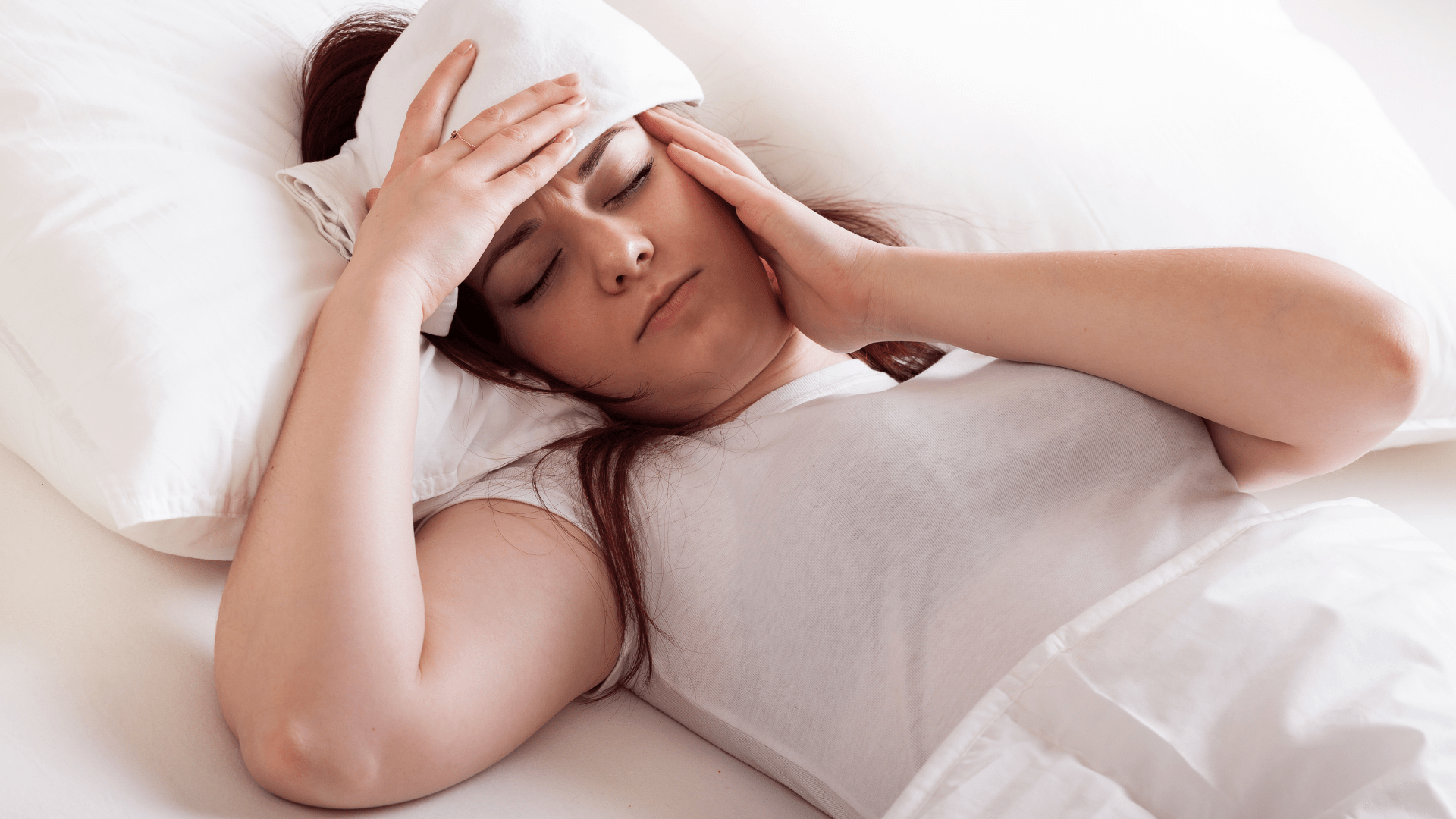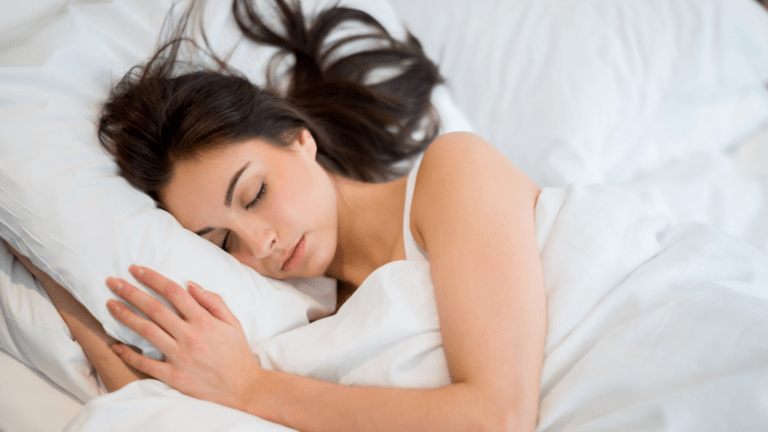Many people think that headaches are just a normal part of life or that they only stem from stress or dehydration. But did you know that migraine from lack of sleep could also be a major culprit behind those pounding headaches? Let’s dive into how insufficient sleep might be causing your discomfort and what you can do about it.

How Sleep Deprivation Leads to Headaches
Sleep deprivation disrupts the brain’s ability to regulate pain, leading to heightened sensitivity and frequent headaches. When you don’t get enough rest, the stress and fatigue can trigger tension-type headaches and increase the frequency and severity of migraines.
Can lack of sleep cause headaches?
Absolutely. When you don’t get enough rest, your brain and body are thrown off balance. This imbalance can lead to tension and migraines, which can make your head feel like it’s going to explode. It’s not just a mild annoyance—chronic sleep deprivation can turn into a serious health issue, manifesting in frequent headaches.
How does sleep deprivation lead to migraines?
When you’re short on sleep, your brain’s ability to regulate pain can diminish. This means that even minor discomforts can be magnified into severe migraines. Studies show that people who suffer from insomnia or irregular sleep patterns are more likely to experience chronic migraines. So, yes, lack of sleep isn’t just a side note—it’s a key player in migraine attacks.
Symptoms of Headaches Due to Lack of Sleep
Headaches from lack of sleep often present as a persistent, dull ache or pressure around the head, sometimes accompanied by sensitivity to light and sound. You may also experience increased fatigue and irritability along with these headaches.

What does a headache from lack of sleep feel like?
If you’ve been battling sleepless nights, you might recognize the symptoms of a sleep-related headache. These headaches often feel like a pressure or tightness around your head. They can be dull or throbbing, and they might come with other symptoms like sensitivity to light or sound. Essentially, the less sleep you get, the more intense and frequent your headaches can become.
For those asking, can no sleep cause headaches? The answer is yes. Even a single night of poor sleep can trigger a headache. However, ongoing sleep issues can lead to chronic headaches, making it crucial to address your sleep habits.
How does lack of sleep contribute to migraines?
Migraines from lack of sleep often come with severe pain on one side of the head, nausea, and sometimes vomiting. The longer the sleep deprivation continues, the more severe these migraines can become.
Sleep Deprivation and Migraines: The Scientific Connection
Research backs up the connection between sleep deprivation and headaches. Sleep deprivation and migraines have been studied extensively, and findings indicate that disrupted sleep patterns can significantly increase the frequency and intensity of migraine attacks. Your body’s internal clock and its ability to manage pain are both affected when you’re not getting adequate rest.
Headache and sleeplessness are more than just coincidental—they’re deeply connected. When your sleep cycle is off, it can disrupt your body’s natural pain control systems, leading to more frequent and severe headaches.
Identifying Headaches Linked to Sleep Issues
To identify if your headaches are linked to sleep issues, note if they frequently occur after poor or insufficient sleep. Keeping a sleep diary alongside tracking headache patterns can help reveal if a lack of rest is the underlying cause.
How can you tell if your headache is caused by a lack of sleep?
If you often find yourself with a headache after a night of little sleep, it’s worth considering that the two might be related. Headache due to lack of sleep is a common issue, and identifying it involves paying attention to your sleep patterns and headache frequency.
Recognizing and Addressing Headaches Linked to Insomnia and Sleep Deprivation
For many, insomnia headache or insufficient sleep headache is a clear sign that their sleep needs aren’t being met. Keeping a headache and sleep diary might help you pinpoint patterns and triggers, leading to more effective management strategies.
In summary, lack of sleep can cause headaches, including migraines, by disrupting your body’s natural balance and pain management systems. If you’re struggling with this issue, it might be time to evaluate your sleep habits and consider ways to improve your rest.
The Science Behind Sleep and Headaches
You might think that sleep and headaches are unrelated issues or that headaches are just a random inconvenience. But the truth is, there’s a strong scientific link between sleep patterns and headaches. If you’re struggling with headaches and suspect lack of sleep might be to blame, you’re on the right track. Let’s break down why and how sleep deprivation impacts your head.
Why Does Lack of Sleep Cause Migraines?
Lack of sleep disrupts the brain’s ability to regulate pain, making you more susceptible to migraine attacks. Additionally, sleep deprivation can increase stress hormones, further triggering migraine episodes and intensifying their severity.
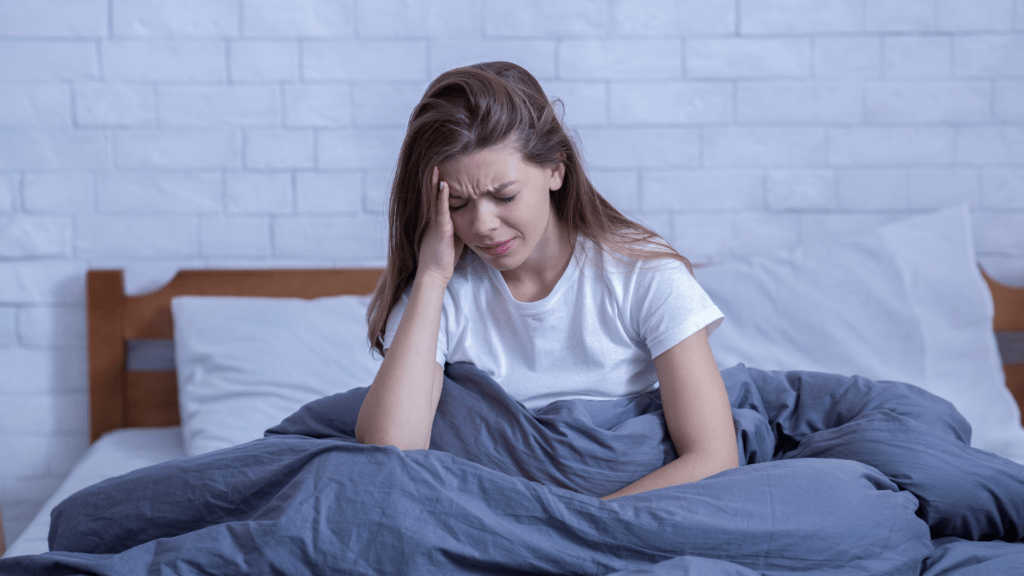
Can lack of sleep cause migraines?
Absolutely. Migraines from lack of sleep are not just a coincidence; they have a scientific basis. When you don’t get enough sleep, your brain’s ability to manage pain decreases. This means even minor stressors can trigger severe migraines. Sleep is crucial in regulating various brain functions, including pain perception. So, when you skimp on sleep, you’re more likely to experience intense migraine attacks.
How does sleep deprivation lead to migraines?
Research indicates that sleep deprivation affects the brain’s pain pathways. When you miss out on quality rest, your brain’s ability to handle and process pain can become impaired. This results in migraines that are more frequent and severe. Moreover, irregular sleep patterns can disrupt your circadian rhythm, which is linked to migraine severity. Thus, ensuring regular, quality sleep is essential to prevent these debilitating headaches.
Headache and Sleeplessness: How They Interact
Headache and sleeplessness are tightly connected. When you’re not sleeping enough, your body’s stress levels increase, which can lead to tension headaches. These headaches often feel like a band tightening around your head. In some cases, this can evolve into more severe migraines if the lack of sleep persists.
Migraine and insomnia often go hand in hand. Insomnia disrupts your sleep cycle, which can trigger migraine attacks. The frustration and stress from not being able to sleep can also contribute to headache pain. This interplay between insomnia and migraines creates a vicious cycle that’s hard to break without addressing both issues simultaneously.
Migraine from Lack of Sleep: The Research
Studies on sleep deprivation and migraines reveal that people who don’t get enough rest are at a higher risk for migraine attacks. Sleep deprivation and migraine headaches are commonly reported together, and for good reason. Your body’s inability to cope with stress and pain is heightened by a lack of sleep, making you more susceptible to severe headaches.
Sleep deprivation headache is a term used to describe headaches that occur specifically due to insufficient rest. This type of headache can vary in intensity and may be accompanied by other symptoms like nausea or sensitivity to light, typical of migraines. Addressing sleep issues is crucial for reducing the frequency and severity of these headaches.
Identifying Symptoms and Diagnosing Headaches from Lack of Sleep
To diagnose headaches from lack of sleep, pay attention to when they occur and if they intensify after nights of poor rest. Common symptoms include a dull, persistent ache and increased sensitivity to light and sound, signaling a potential connection to your sleep habits.
How can you tell if your headache is caused by a lack of sleep?
It’s essential to observe your headache patterns and link them with your sleep habits. Headache due to lack of sleep often occurs after nights of poor or insufficient rest. If you consistently wake up with a headache or notice headaches becoming more frequent during periods of inadequate sleep, the two might be connected.
Insomnia headache or insufficient sleep headache typically presents as a dull, persistent pain or a feeling of pressure around the head. You might also experience headaches from being tired or headaches from not sleeping enough if your sleep schedule is irregular. Keeping a diary of your sleep and headache occurrences can help in identifying if a pattern exists.
Diagnosing and Managing Headaches from Sleep Deprivation
Diagnosing headaches related to sleep deprivation involves evaluating your sleep patterns and headache frequency. If you regularly experience headaches after poor sleep, it’s a strong indication that sleep deprivation is a factor. What helps headaches from lack of sleep? Improving your sleep hygiene is key. This includes maintaining a consistent sleep schedule, creating a restful sleep environment, and addressing any underlying insomnia issues.
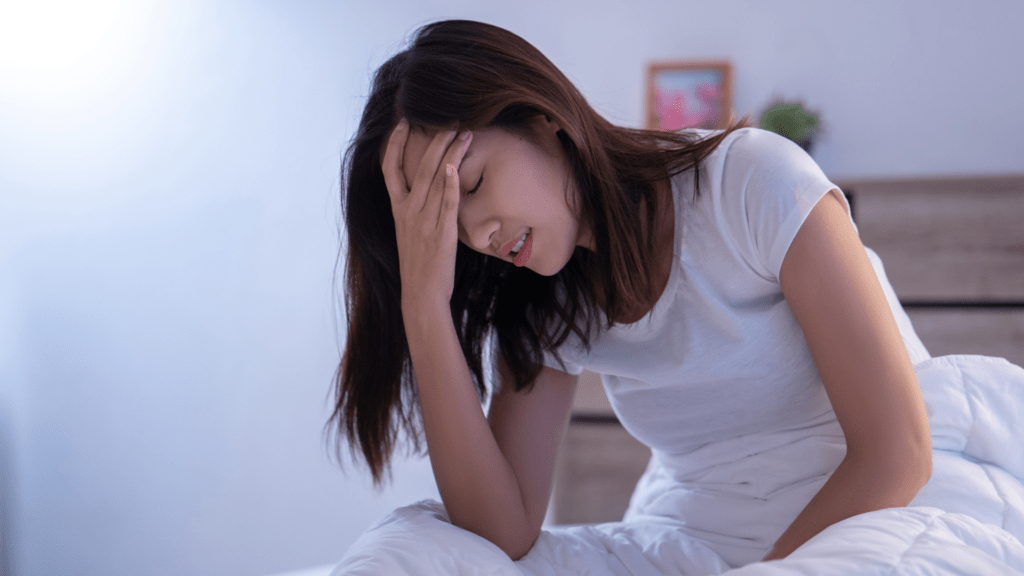
In summary, understanding the relationship between headaches and trouble sleeping is vital for managing and preventing them. If you suspect that your headaches are due to a lack of sleep, focusing on improving your sleep habits can significantly alleviate your symptoms.
Strategies to Prevent and Manage Headaches Caused by Lack of Sleep
Many people think that headaches from lack of sleep are just a part of their daily grind and that they have to live with it. However, the truth is, that you can manage and prevent these headaches with the right strategies. Let’s explore some effective ways to address sleep-related headaches and ensure you wake up refreshed, without that pounding pain.
Tips for Improving Sleep to Prevent Headaches
Establishing a consistent sleep schedule and creating a calming bedtime routine can significantly enhance your sleep quality. Additionally, minimizing screen time before bed and ensuring a dark, quiet sleep environment can help prevent headaches linked to a lack of rest.
What helps headaches from lack of sleep?
Improving your sleep quality is crucial for headache prevention. Here are some actionable tips to enhance your sleep and minimize those annoying headaches:
Establish a Consistent Sleep Schedule
Go to bed and wake up at the same time every day, even on weekends. This helps regulate your body’s internal clock, making it easier to fall asleep and stay asleep.
Create a Restful Sleep Environment
Ensure your bedroom is dark, quiet, and cool. Consider using blackout curtains or a white noise machine to block out disturbances. A comfortable mattress and pillow can also make a significant difference.
Limit Caffeine and Alcohol
Both substances can interfere with your sleep cycle. Try to avoid them, especially in the hours leading up to bedtime.
Relax Before Bed
Engage in calming activities like reading or taking a warm bath to wind down. Avoid screens (phones, computers, TVs) before bed, as the blue light can disrupt your sleep.
Watch Your Diet
Eating a balanced diet and avoiding large meals before bedtime can improve sleep quality. Foods high in sugar and caffeine can negatively affect your sleep.
Exercise Regularly
Regular physical activity can help you fall asleep faster and enjoy deeper sleep. Just make sure not to exercise too close to bedtime, as it might make it harder to wind down.
Managing Insomnia and Migraines
Managing insomnia and migraines often requires a multi-faceted approach. Here’s what you can do:
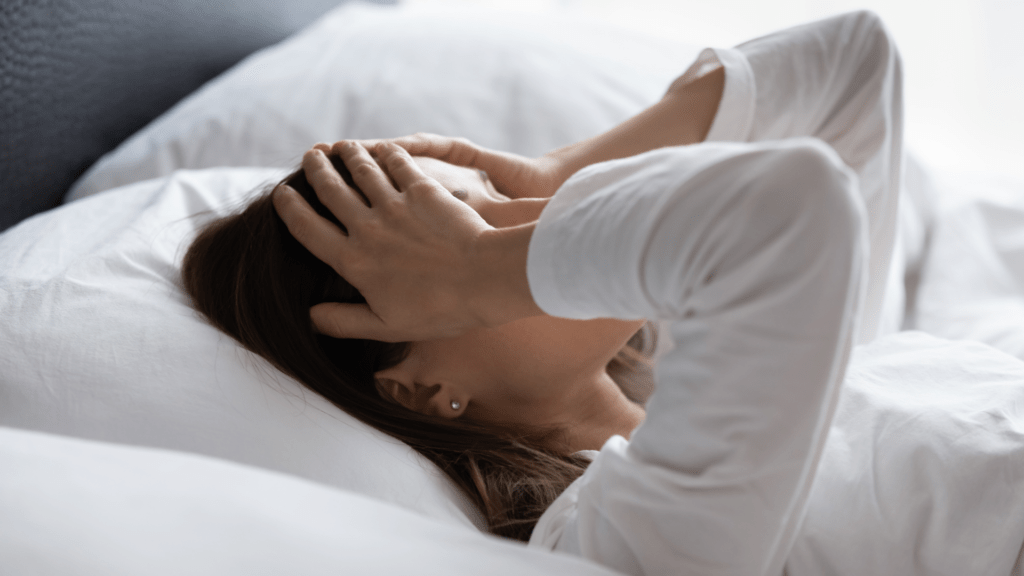
Address Insomnia Directly
If insomnia is a persistent issue, consider speaking with a healthcare provider. Cognitive Behavioral Therapy for Insomnia (CBT-I) is a proven method to help people overcome sleep difficulties. Addressing insomnia directly can be crucial in reducing the risk of migraine from lack of sleep, as poor sleep is a known trigger for these debilitating headaches.
Use Migraine-Specific Treatments
Over-the-counter medications can help manage migraine symptoms, but for chronic issues, a doctor might prescribe specific treatments or preventative medications. Targeted migraine treatments can alleviate the discomfort caused by migraine from lack of sleep, helping you maintain a more balanced and pain-free life.
Implement Relaxation Techniques
Stress can exacerbate both insomnia and migraines. Techniques such as meditation, deep breathing exercises, and progressive muscle relaxation can help reduce stress and improve sleep quality. Incorporating these techniques into your routine can minimize the likelihood of experiencing a migraine from lack of sleep by promoting a calmer mind and better rest.
Keep a Sleep Diary
Track your sleep patterns and headache occurrences. This can help identify triggers and patterns, making it easier to address the root cause of your headaches. Keeping a sleep diary is an effective way to pinpoint how migraine from lack of sleep impacts your daily life, allowing for more targeted interventions.
Lifestyle Changes to Reduce Sleep Deprivation and Headaches
Making lifestyle changes can significantly impact how well you sleep and how often you experience headaches. Here’s what you can do:
Prioritize Sleep
Treat sleep as a priority, not a luxury. Ensure you allocate enough time for rest and consider adjusting your schedule to accommodate better sleep habits. Addressing migraine from lack of sleep starts with creating a consistent sleep routine, promoting better rest, and reducing the frequency of headaches.
Manage Stress Effectively
Find healthy ways to manage stress, such as regular exercise, engaging in hobbies, or seeking professional help if needed. Stress can contribute to migraine from lack of sleep, so adopting relaxation techniques like meditation or deep breathing can improve both sleep quality and headache management.
Balance Work and Rest
Ensure you take breaks during work to avoid burnout. Incorporate short naps if necessary, but try not to nap too close to bedtime. Proper work-rest balance can help prevent migraine from lack of sleep by allowing your body and mind to recuperate, reducing tension and headache triggers.
Evaluate Your Health
Sometimes, underlying health conditions can contribute to sleep issues and headaches. Regular check-ups with your healthcare provider can help identify and address any potential problems.
By implementing these strategies, you can manage and prevent headaches caused by lack of sleep. Improving your sleep habits, managing insomnia, and making lifestyle changes can significantly reduce the frequency and intensity of your headaches. If you continue to experience issues despite these efforts, consider consulting a healthcare professional for further guidance.
Additional Resources for Managing Headaches from Lack of Sleep
A lot of people believe that headaches due to lack of sleep are just a minor inconvenience or that they have to be endured without much help. However, there are many resources available to help you understand and manage these headaches effectively. If you’re dealing with sleep-related headaches, exploring these additional resources can provide valuable support and information.
Further Reading on Sleep Deprivation and Headaches
Sleep deprivation and headaches can be better understood by diving into specialized literature. Books and articles on this topic offer in-depth insights into how lack of sleep impacts your health and provide practical strategies for improvement. Some key reads include:
Why We Sleep
Unlocking the Power of Sleep and Dreams” by Matthew Walker – This book offers a comprehensive look at sleep science, including how sleep deprivation can lead to headaches and other health issues.
The Sleep Solution
Why Your Sleep is Broken and How to Fix It” by W. Chris Winter – This book provides actionable advice on improving sleep quality, which can help reduce headaches caused by insufficient rest.
Recommendations for Books and Guides on Managing Migraine and Insomnia
Managing migraines and insomnia effectively often requires specialized knowledge. Here are some recommended books and guides to help you.
The Migraine Relief Plan
A 3-Step Program for Reducing Pain, Managing Triggers, and Preventing Attacks” by Stephanie Weaver – This guide offers practical steps for managing migraine attacks, including tips for improving sleep.
The Insomnia Workbook
A Comprehensive Guide to Getting the Sleep You Need” by Stephanie Silberman – This workbook provides strategies and exercises to overcome insomnia, which can help prevent headaches from lack of sleep.
Useful Tools for Tracking Sleep Patterns and Headaches
Tracking your sleep and headache patterns can be instrumental in managing symptoms effectively. Here are some tools and apps that can help.
Sleep Tracking Apps
Apps like Sleep Cycle or Pillow can monitor your sleep patterns and provide insights into how your sleep affects your headaches. These apps track sleep quality and offer recommendations for improvement.
Headache Diary Apps
Apps such as Migraine Buddy or Headache Diary allow you to log your headache occurrences, triggers, and duration. This can help you identify patterns and make necessary adjustments to your sleep habits.
Sleep and Health Journals
Keeping a physical journal to record your sleep patterns, headache frequency, and lifestyle factors can also be helpful. This manual approach allows for detailed tracking and reflection.
Conclusion
Accessing additional resources and tools can provide valuable support in managing migraine from lack of sleep. Whether you’re looking for comprehensive books, practical guides, or tracking tools, there’s a wealth of information available to help you improve your sleep and reduce headache frequency. By utilizing these resources, you can take proactive steps toward better sleep and overall health.
